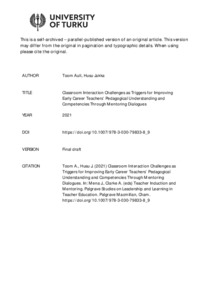Classroom Interaction Challenges as Triggers for Improving Early Career Teachers’ Pedagogical Understanding and Competencies Through Mentoring Dialogues
Toom Auli; Husu Jukka
https://urn.fi/URN:NBN:fi-fe2022021619470
Tiivistelmä
This chapter reports the study that explored challenges that early career teachers experienced in the classroom interaction and the mentoring dialogues linked to these challenges. Early career teachers’ experienced challenges in the classroom interaction served as vehicles for the dialogues and opened up possibilities for learning and development as teacher. Mentoring can effectively support early career teachers’ professional understanding and development as teachers when it is tightly linked to the practice of teaching. The results showed that early career teachers identified both academic challenges (61%) and social challenges (39%) in the classroom interaction. The mentoring dialogues linked to these challenges varied: most of the dialogues were appraising (42%), one third of the dialogues emphasized understanding (33%) and the rest of the dialogues were solution-seeking (25%). In the dialogues, early career teachers and their mentors reached different levels of understanding the challenges and seeking to overcome the challenges. The study confirms that by focusing on the challenges in classroom interaction in the mentoring dialogues, both early career teachers and their mentors can extend their perspectives of the complexities of classroom interaction, perceive the challenges as possibilities for learning professionally and reach shared understandings that can be utilized for the development of the whole school community.
Kokoelmat
- Rinnakkaistallenteet [27094]
